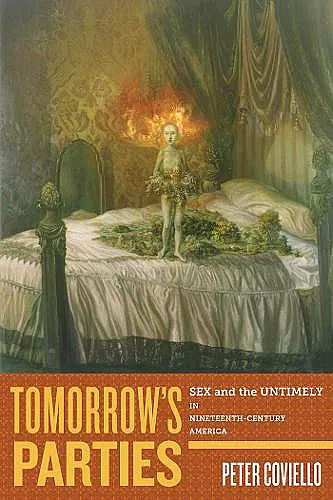Tomorrow's Parties
Sex and the Untimely in Nineteenth-Century America
Format:Paperback
Publisher:New York University Press
Published:19th Apr '13
Currently unavailable, and unfortunately no date known when it will be back

Provides a rich new conceptual language to describe the movements of sex in nineteenth-century America before it solidified into the sexuality we know
Honorable Mention for the 2014 MLA Alan Bray Memorial Award
Finalist for the 2013 LAMBDA LGBT Studies Book Award
In nineteenth-century America—before the scandalous trial of Oscar Wilde, before the public emergence of categories like homo- and heterosexuality—what were the parameters of sex? Did people characterize their sexuality as a set of bodily practices, a form of identification, or a mode of relation? Was it even something an individual could be said to possess? What could be counted as sexuality?
Tomorrow's Parties: Sex and the Untimely in Nineteenth-Century America provides a rich new conceptual language to describe the movements of sex in the period before it solidified into the sexuality we know, or think we know. Taking up authors whose places in the American history of sexuality range from the canonical to the improbable—from Whitman, Melville, Thoreau, and James to Dickinson, Sarah Orne Jewett, Harriet Jacobs, Frederick Douglass, and Mormon founder Joseph Smith—Peter Coviello delineates the varied forms sex could take in the lead-up to its captivation by the codings of "modern" sexuality. While telling the story of nineteenth-century American sexuality, he considers what might have been lostin the ascension of these new taxonomies of sex: all the extravagant, untimely ways of imagining the domain of sex that, under the modern regime of sexuality, have sunken into muteness or illegibility. Taking queer theorizations of temporality in challenging new directions, Tomorrow's Parties assembles an archive of broken-off, uncreated futures—futures that would not come to be. Through them, Coviello fundamentally reorients our readings of erotic being and erotic possibility in the literature of nineteenth-century America.
"Succeeds at expanding the analytic vocabulary for describing intimate experience in the nineteenth century. Coviellos efforts to track the shifting meanings of time and sex will undoubtedly appeal to those with an interest in temporality, and anyone with an interest in Thoreau, Whitman, Dickinson and the other subjects will appreciate Coviellos careful yet imaginative readings." (Lambda Literary) "Coviello models a profoundly sensitive approach to nineteenth-century American literatures & & broken-off futuresone that is willing and ableto get caught up in these authors ardent optimism and depressive realism and to ask, along with Thoreau, & & What is that other kind of lifeto which I am thus continually allured?" (Nineteenth-Century Literature) "In Intimacy in America: Dreams of Affiliation in Antebellum Literature, Coviello (Bowdoin College) offered a rereading of canonical 19th-century authors, focused on the problematic role that race played in constructing a sense of Americanness. Coviello returns with an even more ambitious reexamination of 19th century literature, focused on exploring what counted as sexuality during this period. Considering works by Henry David Thoreau, Walt Whitman, Henry James, Sarah Orne Jewett, Emily Dickinson, and Frederick Douglass, and writing by Mormon founder Joseph Smith, Coviello aims to disrupt views of the 19th century as primarily anticipating the development of modern taxonomies of sexuality. Instead, he examines 'errant possibilities for imagining sex that have sunk into kind of muteness with the advent of modern sexuality.' Coviello explicates texts and passages in which sexuality is represented as distinctly different from the modern regime of sexual specification, whether it is Thoreau's descriptions of 'exquisite carnal ravishment by sound' or Smith's attempt to pursue 'enlargement' via plural marriage. This book breaks new ground in theorizations of temporality for those working in queer theory, gender studies, and 19th century literature" (Choice) "Integral to the books success is Coviellos masterful style; he does not overwhelm the text in question but suggests new historical frameworks for & reading sexuality so his subjects can more easily speak for themselves." (American Nineteenth Century History) "In luminous readings of Henry David Thoreau, Frederick Douglass, Herman Melville, Joseph Smith, Sarah Orne Jewett, and Henry James, among others, Tomorrows Parties provides a glimpse of some of the unrealized possibilities of sex in the long, last moments before it might have known itself as & sexuality in its modern senses" (American Literary History) "Coviello combines historical analysis and contemporary interpretation of former famous worksqueer reading as we call it today. Coviello always mentions his main problem: it would be impolite and incorrect to apply modern sexualities to the Victorian era. In the gay movement, Walt Whitman had been renamed as a gay writerCoviello emphasizes, & gay hadnt existed in Whitmans days. So Coviello is far from easy deconstructivism. He takes readers on a 200-page journey into nineteenth-century livelihood. Modern theorists may assist in social analysis, but Coviello never misuses them for explanations of the past. [] Coviellos book is worth reading. He offers great description and interpretation of literary sexual discourse in 19th century America." (Sexuality and Culture)
ISBN: 9780814717417
Dimensions: unknown
Weight: 363g
265 pages